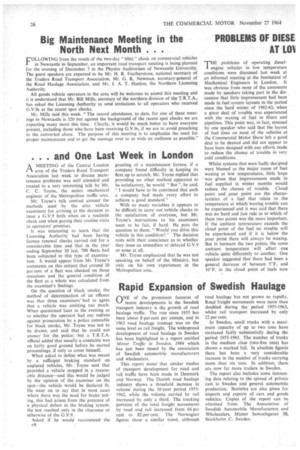. . . and One Last Week in London
Page 28

If you've noticed an error in this article please click here to report it so we can fix it.
MEETING of the Central London rt area of the Traders Road Transport Association last week to discuss maintenance problems was well attended and treated to a very interesting talk by Mr. C. C. Toyne, the senior mechanical engineer of the Metropolitan traffic area.
Mr. Toyne's talk centred around the methods used by the area vehicle examiners for arriving at the decision to issue a G.V.9 both when on a roadside check and when paying their routine visits to operators' premises.
It was interesting to learn that the Licensing Authority had been having licence renewal checks carried out for a considerable time and that in the year ending September 30 last, 700 fleets had been subjected to this type of examination. It would appear frOm Mr. Toyne's comments on this subject that around 20 per cent of a fleet was checked on those occasions and the general condition of the fleet as a whole was calculated from the examiner's findings.
On the question of black smoke, the method of determination of an offence was that three examiners had to agree that a vehicle was emitting too much. When questioned later in the evening as to whether the operator had any redress against prosecution by a police constable for black smoke, Mr. Toyne was not to be drawn, and said that he could not answer for the police; but a T.R.T.A. official added that usually a constable was on fairly good ground before he started proceedings, if only to cover himself.
When asked to define what was meant by a sufficient braking standard on unplated vehicles, Mr. Toyne said that provided a vehicle stopped in a reasonable distance—and this would be judged by the opinion of the examiner on the spot—the vehicle would be declared fit. He went on to say that in most cases where there was the need for brake testing, this had arisen from the presence of a physical defect in the braking system, the test resulted only in the clearance or otherwise of the G.V.9.
4.sked if he would recommend the c•ft granting of a maintenance' licence, if a company found difficulty in keeping its fleet up to scratch, Mr. Toyne replied that providing no other method appeared to be satisfactory, he would. "But ", he said, "I would have to be convinced that such a company had made every effort to achieve a good standard."
With so many variables it appears to be difficult to carry out vehicle checks to the satisfaction of everyone, but Mr. Toyne's instructions to his examiners seem to be fair, if hard. He puts the question to them: "Would you drive this vehicle in this condition?" The decision rests with their conscience as to whether they issue an immediate or delayed G.V.9 or none at all.
Mr. Toyne emphasized that he was not speaking on behalf of the Ministry, but only on his own experiences in the Metropolitan area.
















































































































